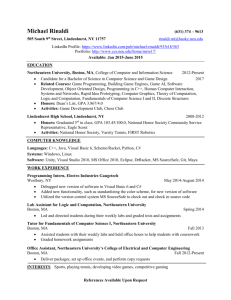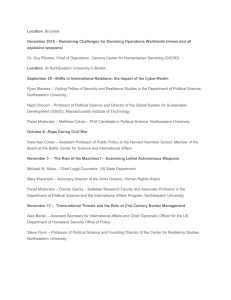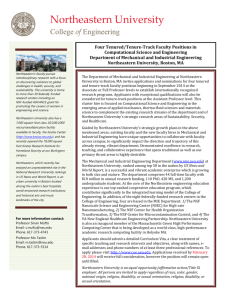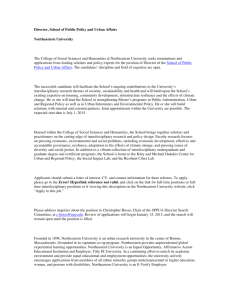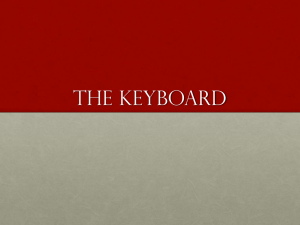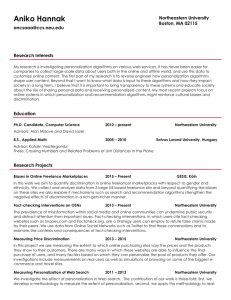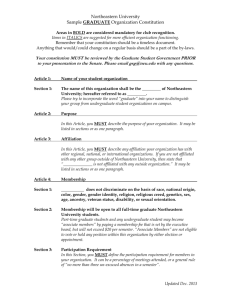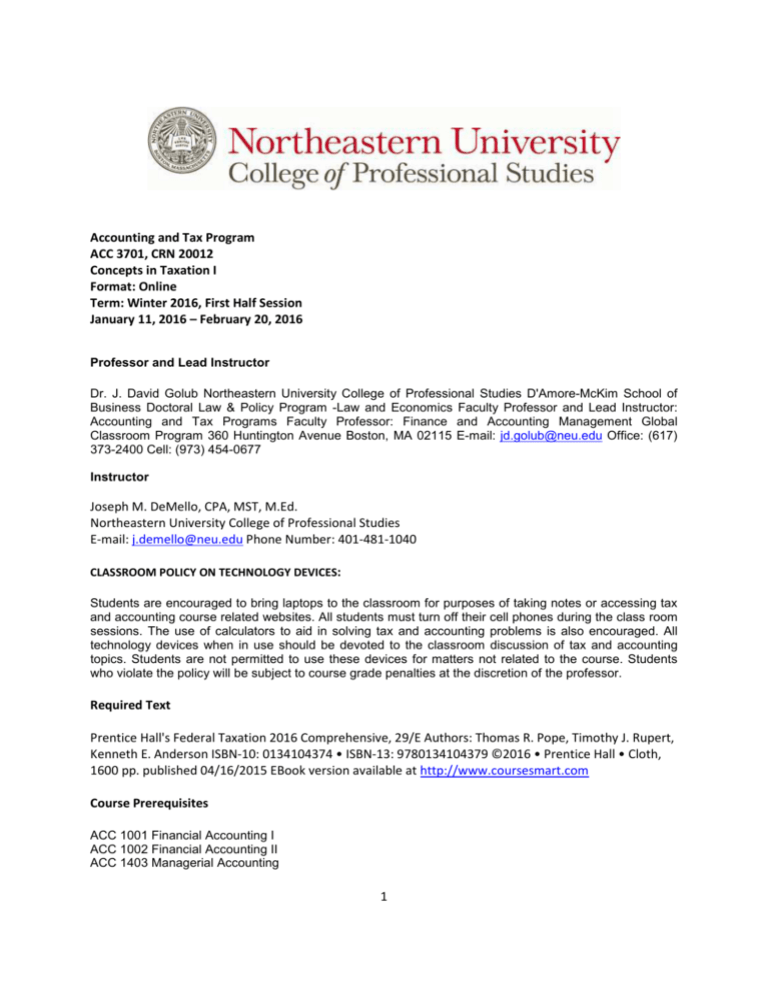
Accounting and Tax Program
ACC 3701, CRN 20012
Concepts in Taxation I
Format: Online
Term: Winter 2016, First Half Session
January 11, 2016 – February 20, 2016
Professor and Lead Instructor
Dr. J. David Golub Northeastern University College of Professional Studies D'Amore-McKim School of
Business Doctoral Law & Policy Program -Law and Economics Faculty Professor and Lead Instructor:
Accounting and Tax Programs Faculty Professor: Finance and Accounting Management Global
Classroom Program 360 Huntington Avenue Boston, MA 02115 E-mail: jd.golub@neu.edu Office: (617)
373-2400 Cell: (973) 454-0677
Instructor
Joseph M. DeMello, CPA, MST, M.Ed.
Northeastern University College of Professional Studies
E-mail: j.demello@neu.edu Phone Number: 401-481-1040
CLASSROOM POLICY ON TECHNOLOGY DEVICES:
Students are encouraged to bring laptops to the classroom for purposes of taking notes or accessing tax
and accounting course related websites. All students must turn off their cell phones during the class room
sessions. The use of calculators to aid in solving tax and accounting problems is also encouraged. All
technology devices when in use should be devoted to the classroom discussion of tax and accounting
topics. Students are not permitted to use these devices for matters not related to the course. Students
who violate the policy will be subject to course grade penalties at the discretion of the professor.
Required Text
Prentice Hall's Federal Taxation 2016 Comprehensive, 29/E Authors: Thomas R. Pope, Timothy J. Rupert,
Kenneth E. Anderson ISBN-10: 0134104374 • ISBN-13: 9780134104379 ©2016 • Prentice Hall • Cloth,
1600 pp. published 04/16/2015 EBook version available at http://www.coursesmart.com
Course Prerequisites
ACC 1001 Financial Accounting I
ACC 1002 Financial Accounting II
ACC 1403 Managerial Accounting
1
Course Description
This course emphasizes basic concepts in taxation and how these concepts relate to individuals. It
addresses issues of tax planning and research. The course also covers property transactions, including
nontaxable transactions, and fundamental tax law relating to estates, trusts, and gifts.
Course Outcomes
Some specific learning outcomes include:
•
•
•
•
•
•
The sources of tax law.
Grasping and understanding basic definitional concepts of taxation.
Gaining a clear understanding of what should be taxed, and why.
Learning federal income tax preparation of individual tax returns.
Understanding tax planning to minimize overall tax liability.
Learning various property transactions and tax concepts such as tax basis and realized gain vs.
recognized gain.
Understanding and distinguishing among various non-taxable and tax-deferred transactions.
Understanding the tax rules for depreciation and amortization.
•
•
Tax Topics
o
o
o
o
o
o
o
o
o
What is meant by filing status?
What is the definition of Gross Income, Adjusted Gross Income and Taxable Income?
What sources of income may be excluded from taxation?
What are allowable tax deductions?
What are examples of capital assets?
What is the gain or loss realized and recognized when an asset is sold or exchanged?
What are tax credits?
How are tax payments made?
Why do governments need a tax system?
Course Methodology
Each week, you will be expected to:
1.
2.
3.
4.
5.
Review the week's learning objectives.
Complete all assigned readings.
Participate in the Discussion Board.
View PowerPoint slides and other supplemental materials.
Complete and submit all assignments and tests by the due dates.
Discussion Board and Participation
Each week students are required to complete four written responses to assigned discussion
questions, with accompanying research citations, and three secondary responses (comments to
other student posts) per week.
Also required are the completion of two assigned computational problems and two secondary responses
(comments to other student posts) per week.
Each Discussion Board computational problem is assigned to an individual student. There will also be two
2
weekly computational problems and/or tax research questions assigned to all students as a separate
assignment.
In addition to the Discussion Board, students are expected to actively participate on a weekly basis
reviewing course materials such as audio lectures, PowerPoint slides, and other supplemental
materials.
Communication
All communications through Blackboard e-mail or directly through the Internet shall properly identify the
course, facts and matters that are being questioned and raised and must contain the following information
in the subject heading: ACC 3701, CRN 20012, Winter 2016. All communications shall be addressed to
Instructor Joseph M. DeMello and CC Dr. Golub at the addresses above.
Submission of Work
In the Assignments folder, click on the View/Complete Assignment link to view each assignment. Attach
your completed assignments here and click Submit to turn them in to me. Once your assignment has
been graded, you will be able to view the grade and feedback I have provided by clicking on My Grades
in the Tools module from the Northeastern University Online Campus tab.
Assignments notes:
1. Must be submitted in either Microsoft Word or Excel format. Submitted file names should include
your first initial, last name and chapter number. Tax forms must be submitted in pdf format.
2. Discussion Board assignments require reproduction of the facts and requirements of each and
assigned question or problem followed with your solution.
NEU document on submitting documents on-line into the Blackboard:
http://nuonlinebbsupport.neu.edu/link/portal/8316/8634/Article/955/AssignmentsAssessments-Tips-for-Trouble-Free-Submission-Students
Online Tutoring
Accessing SMARTHINKING is a free 24-7 student tutoring and writing support. University Online
http://www.cps.neu.edu/student-resources/
Northeastern University-OSCCR
Academic integrity matters or student misconduct matters may be referred to the Office of Student
Conduct and Conflict Resolution (OSCCR), at the discretion of the faculty. Students should familiarize
themselves with the policies, practices and procedures of OSCCR at:
www.northeastern.edu/osccr/studentboard.html and the academic integrity policy at
www.northeastern.edu/osccr/academichonesty.html
3
Northeastern University Online Examination Policy
Where appropriate show all computations and provide detailed explanations for partial credit. On-line
exams may be taken once and you have a fixed time period in which to complete the exam. The actual
allotted time period for each exam will be announced in the Blackboard in a section entitled exam
guidelines. It is recommended that students allocate your time according to point values.
Submission via e-mail of portions or selected solutions after the exam has been completed and closed
will not be accepted.
Unless the NEU technology center experiences technical downtime while you are taking the exam,
there will be a point deduction (15-20%) for all self-induced technology errors, such as accidentally
hitting the keyboard, incorrectly or freezing the computer because of human error, or opening the
examination in two screens or simultaneously opening and viewing Blackboard in two locations on
one screen. Thus, those students who need to retake the exam because of such personalized errors
will have a maximum exam potential of reduced by 15-20% subject to the discretion of the faculty.
Modifications
Situations may arise in which course content or course procedures and practices may be changed
because of unforeseen circumstances such as scheduling problems, unexpected serious illness, weather
conditions, technology problems, cyber terrorist attacks or war. Students are required to visit the
Blackboard or individualized e-mail accounts on a daily basis to check for special announcements or
emergency e-mail correspondence covering such unforeseen events. Modifications to course syllabus
requirements, procedures and practices will be provided generally no later than 48 hours after the
occurrence of such an event.
Grading/Evaluation Standards
Discussion board and other assignments
Mid-term examination
Final examination
Total
30%
30%
40%
100%
o
Mid-term examination: T/F, Multiple Choice, and Essay Questions identifying and applying the
basic principles of Individual Taxation.
o
Final examination: T/F and Multiple Choice identifying and applying more advanced principles of
Individual Taxation. Completion of Form 1040, individual income tax return.
NOTE: Late assignments received within one week after the date due, will receive an automatic
10% discount on the grade. Assignments received after one week past the date due, will receive
a 50% discount.
Academic Integrity Policy
The University views academic dishonesty as one of the most serious offenses that a student can commit
while in college and imposes appropriate punitive sanctions on violators. Here are some examples of
academic dishonesty. While this is not an all-inclusive list, we hope this will help you to understand some
4
of the things instructors look for. The following is excerpted from the University’s policy on academic
integrity; the complete policy is available in the Student Handbook. The Student Handbook is available on
the CPS Student Resources page > Policies and Forms.
Cheating – intentionally using or attempting to use unauthorized materials, information or study aids in an
academic exercise.
Fabrication – intentional and unauthorized falsification, misrepresentation, or invention of any data, or
citation in an academic exercise.
Plagiarism – intentionally representing the words, ideas, or data of another as one’s own in any academic
exercise without providing proper citation.
Unauthorized collaboration – instances when students submit individual academic works that are
substantially similar to one another; while several students may have the same source material, the
analysis, interpretation, and reporting of the data must be each individual’s independent work.
Participation in academically dishonest activities – any action taken by a student with the intent of gaining
an unfair advantage.
Facilitating academic dishonesty – intentionally or knowingly helping or attempting to violate any provision
of this policy.
For more information on Academic Integrity, including examples, please refer to the Student Handbook.
Northeastern University Online Policies and Procedures
For comprehensive information please go to http://www.cps.neu.edu/online/
Northeastern University Online Copyright Statement Northeastern University Online is a registered
trademark of Northeastern University. All other brand and product names are trademarks or registered
trademarks of their respective companies. This course material is copyrighted and all rights are reserved
by Northeastern University Online. No part of this publication may be reproduced, transmitted,
transcribed, stored in a retrieval system, or translated into any language or computer language, in any
form or by any means, electronic, mechanical, magnetic, optical, chemical, manual, or otherwise, without
the express prior written permission of Northeastern University Online. Academic integrity matters or
student misconduct matters may be referred to the Office of student conduct and conflict resolution
(OSCCR), at the discretion of the faculty. Students should familiarize themselves with the policies,
practices and procedures of OSCCR at: www.northeastern.edu/osccr/studentboard.html and the
academic integrity policy at www.northeastern.edu/osccr/academichonesty.html
Northeastern University Online Copyright Statement
Northeastern University Online is a registered trademark of Northeastern University.
All other brand and product names are trademarks or registered trademarks of their respective
companies.
This course material is copyrighted and Northeastern University Online reserves all rights. No part of this
publication may be reproduced, transmitted, transcribed, stored in a retrieval system, or translated into
any language or computer language, in any form or by any means, electronic, mechanical, magnetic,
optical, chemical, manual, or otherwise, without the express prior written permission of Northeastern
University Online.
5
Class Schedule / Topical Outline
Week
Dates
Topic
Assignments
1
1/11-1/17
Introduction to Federal
Taxation, Gross Income,
Exclusions from Income,
Determination of Tax
2
1/18-1/24
Capital Gains and Losses,
Chapters I-5 through I-8,
Deductions, Other Losses, Bad
Schedules A, C, D
Debts, Itemized Deductions
3
Chapters I-1 through I-4, IRS
Website, RIA Checkpoint
Employee Business Expenses,
Depreciation
Chapters I-9 and I-10, Form
4562
Midterm Exam
Complete exam as directed in
Blackboard
1/25-1/31
2/1-2/7
Accounting Periods and
Methods, Nontaxable
Exchanges
Chapters I-11 and I-12
5
2/8-2/14
Depreciation Recapture,
Special Tax Computation
Methods, Tax Credits
Chapters I-13 and I-14
6
2/15-2/20
Final Exam
Complete exam as directed in
Blackboard
4
Note: Although this syllabus is the final outline of the contents of this course, the exact material
to be covered is subject to modification as unanticipated circumstances arise. Students should
continuously refer to Blackboard and emails for announcements of changes in the program or
the addition of supplemental materials.
Copyright 2016 © by Northeastern University Online
All Rights Reserved
6

